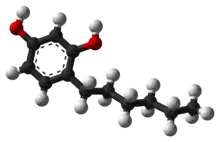Hexylresorcinol
 | |
 | |
| Clinical data | |
|---|---|
| Trade names | Crystoids |
| AHFS/Drugs.com | International Drug Names |
| ATC code | |
| Identifiers | |
IUPAC name
| |
| CAS Number | |
| PubChem CID | |
| ChemSpider | |
| UNII | |
| KEGG | |
| ChEMBL | |
| CompTox Dashboard (EPA) | |
| ECHA InfoCard | 100.004.780 |
| Chemical and physical data | |
| Formula | C12H18O2 |
| Molar mass | 194.27 g·mol−1 |
| 3D model (JSmol) | |
SMILES
| |
InChI
| |
| (verify) | |
Hexylresorcinol is an organic compound with local anaesthetic, antiseptic, and anthelmintic properties.[1]
It is available for use topically on small skin infections, or as an ingredient in throat lozenges. It is marketed as S.T.37 by Numark Laboratories, Inc. (in a 0.1% solution) for oral pain relief and as an antiseptic. Sytheon Ltd., USA markets hexylresorcinol (trade named Synovea HR). Johnson & Johnson uses hexylresorcinol in its Neutrogena, Aveno, and RoC skincare products as an anti-aging cream. Hexylresorcinol has been used commercially by many cosmetic and personal care companies, such as Mary Kay, Clarins, Unilever, Murad, Facetheory, Arbonne, and many small and large companies. As an anthelmintic, hexyresorcinol was sold under the brand Crystoids.
A study published in Chemical Research in Toxicology [2] shows that 4-hexylresorcinol used as a food additive (E-586) exhibits some estrogenic activity, i.e. resembles action of the female sex hormone estrogen. However, recent study published in Applied Sciences [3] shows that 4-hexylresorcinol did not change the expression of estrogen receptor-α, -β, or p-ERK1/2 in MCF-7 cells. In an ovariectomized animal model, the 4HR group showed similar levels of ERα, ERβ, and prolactin expression in the pituitary gland compared to the solvent only group, while the estradiol group showed higher levels. Serum prolactin levels were similar between the 4HR and solvent only groups.
In one study, 4-hexylresorcinol increased the shelf life of shrimp by reducing melanosis (black spots).[4]
In mice with cancer, 4-hexylresorcinol inhibited NF-κB and extended their survival rate.[5]
References
- ↑ Gisvold O (1966). Wilson CO, Gisvold O, Doerge RF (eds.). Textbook of Organic Medicinal and Pharmaceutical Chemistry (5th ed.). Philadelphia: Lippincott. pp. 237–262.
- ↑ Amadasi A, Mozzarelli A, Meda C, Maggi A, Cozzini P (January 2009). "Identification of xenoestrogens in food additives by an integrated in silico and in vitro approach". Chemical Research in Toxicology. 22 (1): 52–63. doi:10.1021/tx800048m. PMC 2758355. PMID 19063592.
- ↑ Kang YJ, Oh JH, Seok H, Jo YY, Kim DW, Garagiola U, Choi JY, Kim SG (2020). "4-Hexylresorcinol Exhibits Different Characteristics to Estrogen". Applied Sciences. 10 (5): 1737. doi:10.3390/app10051737.
- ↑ Montero P (2006). "Effectiveness of Onboard Application of 4-Hexylresorcinol in Inhibiting Melanosis in Shrimp (Parapenaeus longirostris)". Journal of Food Science. 69: C643–C647. doi:10.1111/j.1365-2621.2004.tb09913.x.
- ↑ Kim SG, Lee SW, Park YW, Jeong JH, Choi JY (December 2011). "4-hexylresorcinol inhibits NF-κB phosphorylation and has a synergistic effect with cisplatin in KB cells". Oncology Reports. 26 (6): 1527–32. doi:10.3892/or.2011.1436. PMID 21874263.